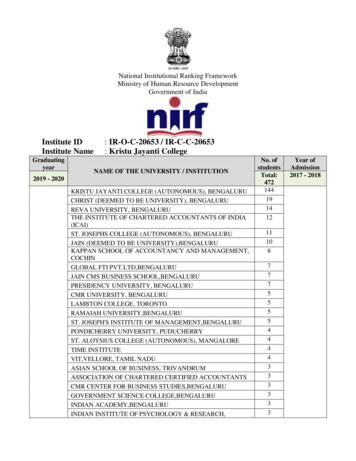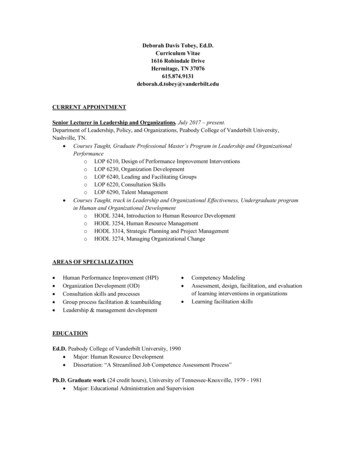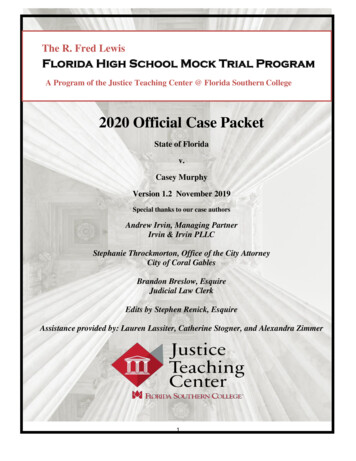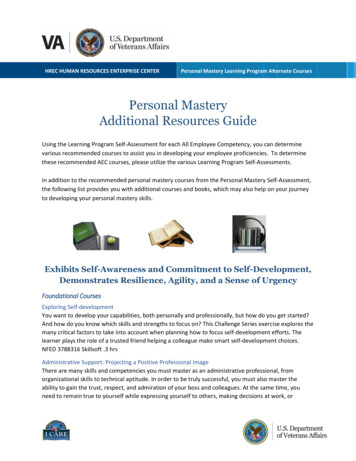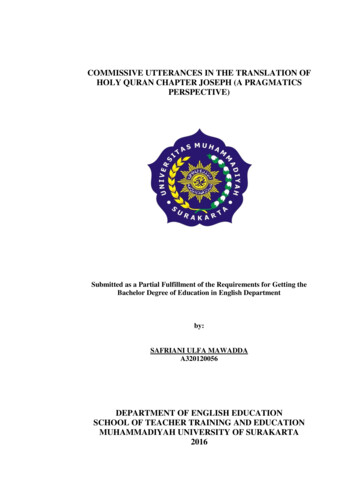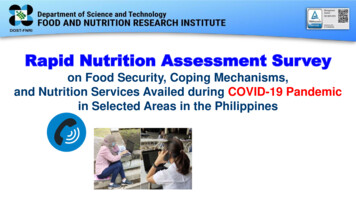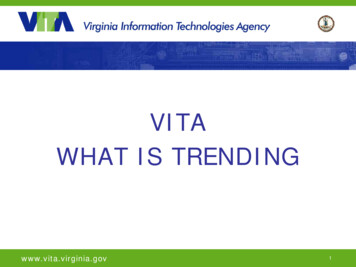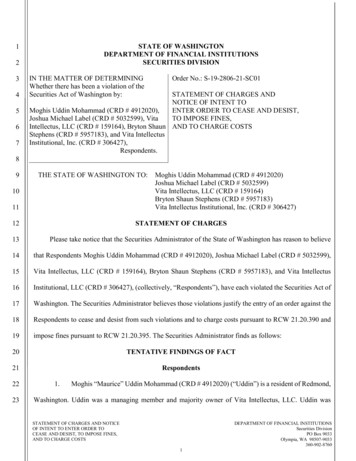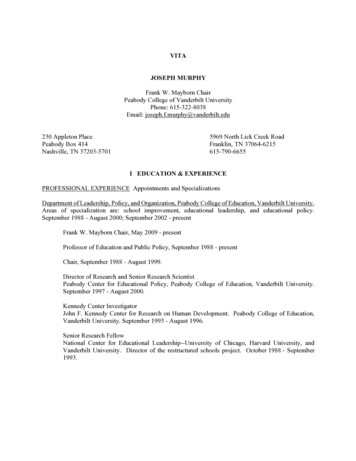
Transcription
VITAJOSEPH MURPHYFrank W. Mayborn ChairPeabody College of Vanderbilt UniversityPhone: 615-322-8038Email: joseph.f.murphy@vanderbilt.edu230 Appleton PlacePeabody Box 414Nashville, TN 37203-57015969 North Lick Creek RoadFranklin, TN 37064-6215615-790-6655I EDUCATION & EXPERIENCEPROFESSIONAL EXPERIENCE Appointments and SpecializationsDepartment of Leadership, Policy, and Organization, Peabody College of Education, Vanderbilt University.Areas of specialization are: school improvement, educational leadership, and educational policy.September 1988 - August 2000; September 2002 - presentFrank W. Mayborn Chair, May 2009 - presentProfessor of Education and Public Policy, September 1988 - presentChair, September 1988 - August 1999.Director of Research and Senior Research ScientistPeabody Center for Educational Policy, Peabody College of Education, Vanderbilt University.September 1997 - August 2000.Kennedy Center InvestigatorJohn F. Kennedy Center for Research on Human Development. Peabody College of Education,Vanderbilt University. September 1993 - August 1996.Senior Research FellowNational Center for Educational Leadership--University of Chicago, Harvard University, andVanderbilt University. Director of the restructured schools project. October 1988 - September1993.
Joseph MurphyPage 2Senior Research AssociateCenter for the Advanced Study of Educational Leadership. Peabody College of Education,Vanderbilt University. August 1988 - July 1993.School of Educational Policy and Leadership, College of Education, The Ohio State UniversityWilliam Ray Flesher Professor, July 2000 – August 2002President, Ohio Principals Leadership Academy, June 2000 – June 2002Department of Administration, Higher, and Continuing Education, College of Education, University ofIllinois, Champaign-Urbana, Illinois. Areas of specialization are: school improvement, educationalleadership, and policyAssociate Professor, August 1984 - July 1988.California State Department of Education, Sacramento, California. Responsible for assisting the ChiefDeputy in reorganizing and redirecting the energies within the State Department toward the educationalagenda of Superintendent Honig. Assisting the Chief Deputy in analyses of all areas of the department withspecial emphasis on instruction and curriculum.Executive Assistant to the Chief Deputy Superintendent of Public Instruction, January1983 - August 1984.Milpitas Unified School District, Milpitas, California. Assisting the Superintendent in translating schoolinstructional effectiveness research into district policies and practices. Also responsible for working withthe superintendent to improve decision-making and communication at the district office.Assistant to the Superintendent, July 1982 - December 1982.William Burnett School, Milpitas, California. Supervision of all teachers; evaluation of half of the teachingstaff; supervision of all instructional aides; curricular supervision and staff development activities for schoolimprovement program; monitoring and evaluation of educational program K-3. Assisting principal withstudent guidance and discipline; responsibility for testing program; coordination with special educationteachers. Total responsibility for financial operations of school (general fund, SIP, special funds).Supervision and control of all building maintenance and custodial operations. Close work with School SiteCouncil; supervision of parent volunteer program.Vice-Principal and School Improvement Program Manager, August 1979 - June 1982.Grandview Heights City School District, Columbus, Ohio. Project Director, Grants Coordinator, School/Community Relations Director, Assistant In-service Education Coordinator. Assisted the Superintendentin a wide range of activities including: preparation of Board Agenda, curriculum development,correspondence, and reports.Administrative Assistant to the Superintendent, September 1978 - June 1979.Alamance County Public Schools, Graham, North Carolina. Grade Chairperson.First Grade Teacher, August 1974 - June 1977.
Joseph MurphyPage 3Hahnemann Medical College Hospital, Philadelphia, Pennsylvania. Fiscal loan officer.Cost Accountant, June 1972 - August 1973.EDUCATIONMuskingum College, New Concord, Ohio. Economics & Business AdministrationB.A. - 1971The University of Chicago, Chicago, Illinois. Elementary EducationM.S.T. - 1974The Ohio State University, Columbus, Ohio. Educational Administration & Public FinancePh.D. – 1980II QUALITY INDICATORSCITATION INDICESReview of Educational Research (2020)Most highly cited authors in educational administrationin the world, 1960-201820Most highly cited authors in educational administrationin the USA, 1960-20188Most influential scholars in the world ineducational administration by co-citation, 1980-20186Most influential scholars in the USAin educational administration by co-citation, 1980-20182Google Scholarcitationsh-indexi 10-index23,24380224Research Gate305 Research Items78,559 Reads5,759 Citations666 Followers29.73 RG Score28.74 Impact Points
Joseph MurphyPage 4RHSU Edu-Scholar Public Influence RankingRating (2020): 39th in the nation1st at Vanderbilt and PeabodyPROFESSIONAL MEMBERSHIPSAmerican Educational Research AssociationHONORSNational Council of Professors of Educational Administration, Cocking Lecture, 2017Edwin M. Bridges Award, University Council of Educational Administration, 2014Legacy Award, Journal of Educational Administration, 2014American Educational Research Association, 2012AERA FellowRoald F. Campbell Award, University Council of Educational Administration, 2011Lifetime achievement awardAmerican Educational Research Association: Division A—Excellence in Research Award, 2009Frank W. Mayborn Chair, Vanderbilt University, 2009Awarded endowed chairAmerican Educational Research Association: Division H, School Evaluation and Program Development,Outstanding Publication (Handbook on Restructuring and Substantial School Improvement), 2008.American Education Research Association: Teaching in Educational Administration SIG, DistinguishedService Award, 2007.American Education Research Association, Professional Service Award, 1998Outstanding contribution relating research to practice.Literati Club and MCB University PressRunner-up to the outstanding article appearing in the Journal of Educational Administration for1995 (Volume 33) (with Emily Myers).American Educational Research AssociationAppointed Editor of The Handbook of Research on Educational Administration by the president ofAERA, 1994.
Joseph MurphyPage 5Literati Club and MCB University PressOutstanding article appearing in the Journal of Educational Administration for 1992 (Volume 30)(with Philip Hallinger).Council of Graduate Students Award for Excellence in Teaching, Advising, and Research, 1988Award given each year to the outstanding teacher of graduate students in the College of Educationat the University of Illinois.American Vocational Education Research AssociationOutstanding article appearing in The Journal of Vocational Educational Research for 1987 (withLinda S. Lotto).Fellow, National Center for Effective School Research and Development, 1987-1989.Jack A. Culbertson Award, University Council for Educational Administration, 1986Award given each year to one outstanding professor in the first ten years of their career in the areaof educational administration.University of Illinois, College of Education Scholar, 1986One of eight faculty in the College of Education designated as a Faculty Scholar. This is the highesthonor offered in the College of Education.
Joseph MurphyPage 6III PROFESSIONAL INFORMATIONNATIONAL COMMISSION MEMBERSHIPS/SERVICESenior Fellow, Asian Pacific Centre for Leadership and Change, 2018Chair, Professional Standards for Educational Leaders Development Team, 2013-2015Fellow, Hong Kong Institute of Education, Center on School Leadership, 2008-2016Chair, National Board Certification for School Leaders Steering Committee, National Board forProfessional Teaching Standards, 2008-2009Co-Chair Expert Panel, Interstate School Leaders Licensure Consortium Standards for School LeadersRevision Group, 2006-2007Chair, Interstate School Leaders Licensure Consortium, National Policy Board for EducationalAdministration, 1994-2004National Advisory Board, High School Survey of Student Engagement, 2004-2005Advisory Member, School System Capacity Team, National Education Association, 2003Member, Center for Research on Education, Diversity, and Excellence Synthesis Team on “TeacherSchool-Systemic Integration for Effective Reform”, 2001-2002Commissioner, National Commission for the Advancement of Educational Leadership Preparation, 20012003Member, AERA Division A Task Force on Developing Research in Educational Leadership, 2001-2004Co-Chair, Task Force on the Principalship, School Leadership for the 21st Century Initiative - Institute forEducational Leadership, 1999-2000National Advisory Board, Principal Residency Network, Big Picture Company, 2000-2001National Planning Committee – Southern Regional Education Board’s Wallace Readers-Digest Grant,2000-2001National Advisory Board, Lenses on Learning — Educational Development Center, 1998-2000National Advisory Board, "KEYS to Excellence in Your School" Project, National EducationalAssociation, 1994-2001Advisory Council Member, Educational Excellence Network, 1989-1997Fellow, National Center for Effective School Research and Development, 1987-1997
Joseph MurphyPage 7Chair, National Resource Bank for Programs in Educational Leadership, National Policy Board forEducational Administration, 1996Vice President, Division A, American Educational Research Association, 1994-1996National Advisory Board, ERIC Clearinghouse on Educational Management, 1994-1996National Study Group on Leadership Questions and Issues Group, 1991-1992Evaluation Advisory Member, Systematic Initiatives Program, National Science Foundation, 1991-1992Program Chair, Division A, American Educational Research Association, 1991National Jury, National Commission for the Principalship, 1990Chair, School Effectiveness and School Improvement SIG, American Educational Research Association,1990 (Program Chair 1989)National Study Group on the Preparation of School Administrators--National Policy Board for EducationalAdministration, 1988-1989National Advisory Panel, The Mayor's (Chicago) Educational Summit, 1988EDITORSHIPS/EDITORIAL BOARDSEditorial Boards/Advisory BoardsJournal of Research on Organization in Education, 2016Educational Administration: Theory and Practice, 2013Journal of Educational Administration, 2011- 2016Journal of Research on Leadership Education, 2005-2007Journal of Effective Schools, 2001-2006; 2013School Effectiveness and School Improvement, 1999-2015School Leadership & Management, 1997International Journal of Leadership in Education, 1997-2006Peabody Journal of Education, 1995-1999Vanderbilt University Press, 1994-1997Journal for a Just and Caring Society, 1994-1996
Joseph MurphyPage 8Journal of School Leadership, 1993-1998EditorshipsThe Handbook of Research on Educational Administration, 1994-1999Edited SeriesCritical Issues in Educational Leadership, Teachers College Press, 1992-2007IV PUBLICATIONSBOOKSUnder Contract: Being Written1. Murphy, J., Bleiberg, J, & Smylie, M., Collective School Leadership. New York, NY: Teacher’sCollege Press.Authored2. Smylie, M., Murphy, J. & Seashore Louis, K., Caring Principals. Thousand Oaks, CA: CorwinPress.3. Smylie, M., Murphy, J. & Seashore Louis, K., Stories of Caring Leadership. Thousand Oaks, CA:Corwin Press.4. Murphy, J., (2020). Bottling Fog: The Wisdom of Leadership . New York, NY: Teacher’sCollege Press.5. Murphy, J., & Bleiberg, J. (2019). School turnaround policies and practices: Learning from failedschool reform. Dordrect, The Netherlands: Springer.6. Murphy, J., & Seashore Louis, K. (2018). Positive school leadership. New York: TeachersCollege.7. Murphy, J. (2017). Professional standards for educational leaders: The empirical, moral, andexperiential foundations. Thousand Oaks, CA: Corwin Press.8. Murphy, J. (2016). Understanding schooling through the eyes of students. Thousand Oaks, CA:Corwin Press.9. Murphy, J. (2016). Leading school improvement: A framework for action. West Palm Beach, FL:Learning Sciences International.10. Murphy, J. (2016). Creating instructional capacity. Thousand Oaks, CA: Corwin Press.
Joseph MurphyPage 911. Murphy, J., & Torre, D. (2014). Creating productive cultures in schools: For students, teachers, andparents. Thousand Oaks, CA: Corwin Press.12. Murphy, J. (2013). The architecture of school improvement: Lessons learned. Thousand Oaks, CA:Corwin Press.13. Murphy, J. (2012). Homeschooling in America. Thousand Oaks, CA: Corwin Press.14. Murphy, J. (2011). Essential lessons for leaders. Thousand Oaks, CA: Corwin Press.15. Murphy, J., & Tobin, K. (2011). Homelessness comes to school. Thousand Oaks, CA: CorwinPress.16. Murphy, J. (2010). The educator’s handbook for understanding and closing achievement gaps.Thousand Oaks, CA: Corwin.17. Murphy, J., & Meyers, C. V. (2008). Turning around failing schools: Leadership lessons from theorganizational sciences. Thousand Oaks, CA: Corwin.18. Murphy, J. (2006). Preparing school leaders: An agenda for research and action. Lanham, MD:Rowman & Littlefield.19. Murphy, J. (2005). Connecting teacher leadership and school improvement. Thousand Oaks,CA: Corwin Press.20. Murphy, J. (2004). Leadership for literacy: Research-based practice, preK-3 Thousand Oaks, CA:Corwin Press.21. Murphy, J., & Shiffman, C. (2002). Understanding and assessing charter schools. New York:Teachers College Press.22. Murphy, J., Beck, L. G., Crawford, M., & Hodges, A. (2001). The productive high school: Creatingpersonalized academic communities. Thousand Oaks, CA: Corwin Press.23. Murphy, J., Gilmer, S., Weise, R., & Page, A. (1998). Pathways to privatization in education.Norwood, NJ: Ablex.24. Beck, L. G., Murphy, J., and Associates. (1997). Ethics in educational administration programs:Emerging models. University Park, PA: University Council for Educational Administration.25. Beck, L. G., & Murphy, J. (1996). The four imperatives of a successful school. Newbury Park, CA:Corwin Press.26. Murphy, J. (1996). The privatization of schooling: Problems and possibilities. Newbury Park, CA:Corwin Press.27. Murphy, J., & Beck, L. G. (1995). School-based management as school reform: Taking stock.Newbury Park, CA: Corwin Press.
Joseph MurphyPage 1028. Beck, L. G., & Murphy, J. (1994). Ethics in educational leadership programs: An expanding role.Newbury Park, CA: Corwin Press.29. Beck, L., & Murphy, J. (1993). Understanding the principalship: Metaphorical themes1920s-1990s. New York: Teachers College Press.30. Murphy, J. (1992). The landscape of leadership preparation: Reframing the education of schooladministrators. Newbury Park, CA: Corwin Press.31. Murphy, J. (1991). Restructuring schools: Capturing and assessing the phenomena. New York:Teachers College Press.Edited1. Young, M. D., Crow, G., Ogawa, R., & Murphy, J., (Eds.) (2009). The handbook of research onthe education of school leaders. New York: Routledge.2. Portin, B. S., Beck, L. G., Knapp, M. S., & Murphy, J. (2003). Self-Reflective renewal in schools:Lessons from a national initiative. Norwood, NJ: Greenwood Publishing Group.3. Murphy, J., & Datnow, A. (Eds.) (2003). Leadership lessons from comprehensive school reform.Thousand Oaks, CA: Corwin Press.4. Murphy, J. (Ed.). (2002). The educational leadership challenge: Redefining leadership for the 21stcentury (National Society for the Study of Education Yearbook, Vol. 101A). Chicago:University of Chicago Press.5. Murphy, J., & Louis, K. S. (Eds.). (1999). Handbook of research on educational administration(2nd ed.). San Francisco: Jossey Bass.6. Murphy, J., & Forsyth, P. (Eds.). (1999). Educational administration: A decade of reform.Thousand Oaks, CA, and Columbia, MO: Corwin Press and The University Council forEducational Administration.7. Murphy, J., & Louis, K. S. (Eds.). (1994). Reshaping the principalship: Insights fromtransformational reform efforts. Newbury Park: Corwin Press.8. Murphy, J. (Ed.). (1993). Preparing tomorrow's school leaders: Alternative designs. UniversityPark, PA. University Council for Educational Administration.9. Hallinger, P., Leithwood, K., & Murphy, J. (Eds.). (1993). A cognitive perspective on educationaladministration. New York: Teachers College Press.10. Murphy, J., & Hallinger, P. (Eds.). (1993). Restructuring schooling: Learning from ongoing efforts.Newbury Park, CA: Corwin Press.11. Murphy, J. (Ed.). (1990). The educational reform movement of the 1980s: Perspectives and cases.Berkeley: McCutchan.
Joseph MurphyPage 1112. Murphy, J., & Hallinger, P. (Eds.). (1987). Approaches to administrative training. Albany: StateUniversity of New York Press.MONOGRAPHS1. Murphy, J. (2015). Notes on the profession. Charlottesville, VA: University Council forEducational Administration.2. Murphy, J. & Vriesenga, M. (2004). Research on preparation programs in educationaladministration: An analysis. Columbia, MO: University Council for EducationalAdministration.3. Murphy, J. (1999). The quest for a center: Notes on the state of the profession of educationalleadership. Columbia, MO: University Council for Educational Administration.EDITED JOURNALS1. Murphy, J. (1999, September). The evolution of school leadership: Realizing the vision of theISLLC Standards through authentic assessment. Journal of Personnel Evaluation in Education,13(3). (0.75)2. Hallinger, P., & Murphy, J. (1992). The principalship: International perspectives. Journal ofEducational Administration, 30(2). (1.118)ARTICLESRefereed Articles1. Murphy, J. (2020). The five essential reasons for the failure of school reforms. Journal of HumanResources and Sustainability Studies.2. Goldring, E., Grissom, J., Neumerski, C., Blissett, R., Murphy, J., & Porter A. (in press). Increasingprincipals time on instructional leadership. Journal of Educational Administration.3. Seashore-Louis, J., & Murphy, J. (2018). The potential of positive school leadership for schoolimprovement. A cross-disciplinary synthesis. Nordic Journal of Studies in Educational Policy.4. Orr, M. T., Pecheone, R., Hollingsworth, L., Beaudin, B., Snyder, J., & Murphy, J. (2017). Theperformance assessment for leaders: Concurrent validity and reliability evidence. Journal ofResearch on Leadership, 139-161.5. Orr, M. T., Pecheone, R., Snyder, J. D., Murphy, J., Palanski, A., Beaudin, B., Hollingsworth, L,& Buttram, J. L. (2017). Performance assessment for principal licensure: Evidence fromcontent and face validation and bias review. Journal of Research on Leadership Education, 107138. DOI: 10.1177/1942775117701179
Joseph MurphyPage 126. Seashore-Louis, K., & Murphy, J. (2016). Trust, caring and organizational learning: The leader'srole. Journal of Educational Administration, 55(1), 1-24. (1.270)7. Minor, E., Murphy, J. Porter, A., & Goldring, E. (2016). A test-retest analysis for the VanderbiltAssessment for Leadership in Education in the United States. Educational Assessment,Evaluation and Accountability, 26, 29-48. (1.56)8. Smylie, M., Murphy, J., & Louis, K. S. (2016). Caring school leadership: A multi-disciplinary,cross-occupational model. American Journal of Education, 123, 1-35. (1.488)9. Murphy, J. (2016). Teacher as unit leader: Defining and examining the effects of care and supporton children. A review of the research. Journal of Human Resource and Sustainability Studies(4) http://.www.scr.p.org/journal/jhrss10. Murphy, J. (2016). Explaining the effects of communities of pastoral care for students. Journal ofEducational Research. 71.2014.003460.(0.84)11. McCarthy, M. M., Shelton, S., & Murphy, J. (2016). Policy penetration of the ISLLC Standards.Leadership and Policy for Schools, 14(3), (0.910)12. Louis, K. S., Murphy, J., & Smylie, M. (2016). Caring leadership in schools: Findings fromexploratory analysis. Educational Administration Quarterly, 52(2), 310-348. (2.570)13. Murphy, J. Neumerski, C., Goldring, E., & Grissom, J. (2016). Bottling fog? The quest forinstructional management. Cambridge Journal of Education, 46(4), 455-471. (0.677)14. Murphy, J. (2015). The empirical and moral foundations of the ISLLC Standards. Journal ofEducational Administration, 53(6), 718-734. (1.118)15. Goldring, E., Xiu, C., Murphy, J., Porter, A., & Elliott, S. (2015). The convergent and divergentvalidity of the Vanderbilt Assessment of Leadership in Education (VAL-ED): Instructionalleadership and emotional intelligence. Journal of Educational Administration, 53(2), 177-196.(1.118)16. Murphy, J. (2015). Creating communities of professionalism: Addressing cultural and structuralbarriers. Journal of Educational Administration, 53(2), 154-176. (1.118)17. Murphy, J. (2015). Forces shaping schooling and school leadership. Journal of School Leadership,25(6), 1064-1087.18. Torre, D., & Murphy, J. (2015). A different lens: Changing perspectives using Photo-ElicitationInterviews. Educational Policy Analysis Archives, 23(123).19. Murphy, J. & Tobin, K. (2014). Homelessness in America: An historical analysis. AmericanEducational History Journal, 41(2), 281-298.
Joseph MurphyPage 1320. Torre, D., & Murphy, D. (2014). Communities of parental engagement: New foundations for schoolleaders. International Journal of Leadership in Education, 1-21. (0.530)21. Murphy, J. & Torre, D. (2014). Vision: Essential scaffolding. Educational Management,Administration and Leadership. (1.090)22. Hallinger, P., Heck, R., & Murphy, J. (2014). Teacher evaluation and school improvement.Educational Assessment, Evaluation and Accountability, 26(1), 5-28. (1.56)23. Covay, E., Porter, A., Murphy, J., Goldring, E. B., Cravens, X., & Elliott, S. N. (2014). A knowngroup analysis validity study of the Vanderbilt Assessment of Leadership in Education.Educational Assessment, Evaluation and Accountability, 26(1), 29-48. (1.56)24. Murphy, J. (2014). The social and educational aspects of homeschooling. Sociological Spectrum,34(3). (0.371)25. Murphy, J. & Torre, D. (2013). Beyond the factors: The threads of school improvement.International Journal of Education and Research, 1(10), 113-132.26. Murphy, J. (2013). Exploring the change in homeschooling, 1970-2010. Home School ResearchJournal, 29(1), 1-15.27. Murphy, J., Hallinger, P., & Heck, R. (2013, September). Leading via teacher evaluation: The caseof the missing clothes. Educational Researcher, 42(6), 349-354. (2.527)28. Murphy, J. (2013). Riding history: The organizational development of homeschooling in the US.American Educational History Journal, 40(2), 335-354.29. Cravens, X., Goldring, E., Porter, A., Polikoff, M., Murphy, J., & Elliott, S. (2013). Settingproficiency standards for school leadership assessment: An examination of cut-score decisionmaking. Educational Administration Quarterly, 49(1), 124-160. (2.580)30. Hallinger, P., & Murphy, J. (2013). Running on empty: Finding the time and capacity to leadlearning. NASSP Bulletin, 97(1), 5-21.31. Louis, K. S., Mayrowetz, Murphy, J., & Smylie, M. (2013). Making sense of distributed leadership:How secondary school educators look at job design. International Journal for EducationalLeadership and Management, 1(1), 33-67.32. Murphy, J. (2013). The architecture of school improvement. Journal of Educational Administration,51(3), 252-263. (1.230)33. Tobin, K., & Murphy, J. (2013). Addressing the needs of homeless families and children. Journalof Applied Research on Children, 4(1),34. Murphy, J., & Tobin, K. (2012, May). Addressing the problems of homeless adolescents. Journalof School Leadership, 22(3), 633-663.
Joseph MurphyPage 1435. Tobin, K. J., & Murphy, J. (2012, Winter). A policy agenda for addressing homelessness. SchoolLeadership Review, 7(1), 71-97.36. Murphy, J. (2011, January-March). Homeless children and youth at risk: The educational impactof displacement. Journal of Education for Students Placed at Risk, 16(1), 38-56.37. Porter, A. C., Polikoff, M. S., Goldring, E., Murphy, J., Elliott, S. N. & May, H. (2010, December).Investigating the validity and reliability of the Vanderbilt Assessment of Leadership inEducation. Elementary School Journal, 111(2), 282-313. (1.083)38. Porter, A. C., Polikoff, M. S., Goldring, E., Murphy, J., Elliott, S. N., & May, H. (2010, April).Developing a psychometrically sound assessment of school leadership: The VAL-ED as a casestudy. Educational Administration Quarterly, 46(2), 135-173. (2.580)39. Murphy, J. (2010, April). Turning around failing schools: Insights for educational leaders. Journalof Educational Change, 11(2), 157-176.40. Polikoff, M. S., May, H., Porter, A. C., Elliott, S. N., Goldring, E., & Murphy, J. (2009, November).An examination of differential item functioning on the Vanderbilt Assessment of Leadershipin Education. Journal of School Leadership, 19(6), 661-679.41. Murphy, J. (2009, November). Turning around failing schools: Policy insights from the corporate,government and non-profit sectors. Educational Policy, 23(6), 796-830. (0.585)42. Goldring, E., Cravens, X., Murphy, J., Elliott, S., Porter, A., & Carson, B. (2009, September). Theevaluation of principals: What and how do states and urban districts assess? Elementary SchoolJournal, 110(1), 19-32. (1.083)43. Murphy, J., Smylie, M., Mayrowetz, D., & Louis, K. S. (2009, April). The role of the principal infostering the development of distributed leadership. School Leadership & Management, 29(2),181-214.44. Louis, K. S., Mayrowitz, D., Smylie, M., & Murphy, J. (2009). The role of trust and sensemakingin developing distributed leadership. Distributed Leadership, 157-180.45. Goldring, E., Porter, A. C., Murphy, J., & Elliott, S. (2009). Assessing learning-centered leadership:Connections to research, professional standards, and current practice. Leadership and Policy inSchools, 8(1), 1-36.46. Murphy, J., & Meyers, C. V. (2009). Rebuilding organizational capacity in turnaround schools:Insights from the corporate, government, and non profit sectors. Educational Management,Administration and Leadership, 37(1), 9-29. (0.405)47. Murphy, J. (2008, October-December). Turnaround insights from the organizational sciences: Areview of the empirical evidence and the development of a staged model of recovery withpotential implications for the PK-12 education sector. Leadership and Policy in Schools, 17(4),331-357.
Joseph MurphyPage 1548. Murphy, J., Moorman, H., & McCarthy, M. M. (2008, October). A comprehensive framework forrebuilding initial certification and preparation programs in school administration: Lessons fromwhole-state reform initiatives. Teachers College Record, 110(10), 2172-2203. (0.75)49. Murphy, J. (2008). The place of leadership in turnaround schools: Insights from organizationalrecovery in the public and private sectors. Journal of Educational Administration, 46(1), 7498. (1.118)50. Murphy, J., Vriesenga, M., & Storey, V. (2007, December). EAQ, 1979-2003: An analysis of typesof work, methods of investigation, and influences. Educational Administration Quarterly,43(5), 612-628. (2.580)51. Meyers, C. V., & Murphy, J. (2007, September). Turning around failing schools: An analysis.Journal of School Leadership, 17(3), 631-659,52. Smylie, M. A., Mayrowetz, D., Murphy, J., & Louis, K. S. (2007, July). Trust and the developmentof distributed leadership. Journal of School Leadership, 17(4), 469-503.53. Murphy, J., Elliott, S. N., Goldring, E., & Porter A. (2007, April). Leadership for learning: Aresearch-based model and taxonomy of behaviors. School Leadership & Management, 27(2),179-201.54. Mayrowetz, D., Murphy, J., Louis, K. S., & Smylie, M. A. (2007, February). Distributed leadershipas work redesign: Retrofitting the job characteristics model. Leadership and Policy in Schools,6(1) 69-101.55. Murphy, J. (2006, December). The evolving nature of the American high school: A punctuatedequilibrium model of institutional change. Leadership and Policy in Schools, 5(4), 1-39, 285324. (invited article) (0.58)56. Murphy, J. (2006, Spring). Some thoughts on rethinking the pre service education of school leaders.Journal of Research on Leadership Education, 1(1).57. Murphy, J. & Vriesenga, M. (2006, April). Research on school leadership preparation in the UnitedStates: An Analysis. School Leadership and Management, 26(2), 183-195. (1.070)58. Murphy, J., Hawley, W. D., & Young, M.F. (2005, Fall). Redefining the education of schoolleaders: Scaffolding a learning-anchored program on the ISLLC Standards. EducationalLeadership Review, 6 (2), 48-57.59. Murphy, J., & Vriesenga, M. (2005, Summer). Developing professionally anchored dissertations:Lessons from innovative programs. School Leadership Review, 1 (1), 33-57.60. Murphy, J. (2005, February) Uncovering the foundations of the ISLLC Standards and addressingconcerns in the academic community. Educational Administration Quarterly, 41 (1), 154-191.(2.580)61. Murphy, J. (2004, March). Leadership for literacy: A Framework for policy and practice. SchoolEffectiveness and School Improvement, 15 (1), 65-96. (1.237)
Joseph MurphyPage 1662. Murphy, J. (2002, April). Reculturing the profession of educational leadership: New blueprints.Educational Administration Quarterly, 38(3), 176-191. (2.580)63. Murphy, J. (2001,November). The changing face of leadership preparation. The SchoolAdministrator, 58(10) 14-18.64. Murphy, J. (2003, January-March). Has marketization improved the quality of education: The caseof charter schools. Journal of Educational Change, 4 (1), 10-18.65. Murphy, J. (2000). A response to English. The International Journal of Leadership in Education, 3(4), 411-414. (0.530)66. Murphy, J. (2000, September). Notes from the cell: A response to English's "interrogation." Journalof School Leadership, 10(5), 464-469. (0.530)67. Mu
VITA JOSEPH MURPHY Frank W. Mayborn Chair Peabody College of Vanderbilt University Phone: 615-322-8038 Email: joseph.f.murphy@vanderbilt.edu 230 Appleton Place 5969 North Lick Creek Road

